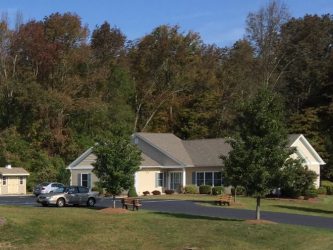Group Homes for Adults with Developmental Disabilities at SCARC

When an individual and their family are exploring the residential option of a group home, there are many questions and concerns:
- For the individual, there may be questions such as – What will it be like living there? Will my life completely change? Who will I live with? And, there are more personal questions – Can I still have Cheerios for breakfast every morning? Will somebody help me get dressed? Can I go bowling on Saturday morning?
- Families and guardians have concerns about quality of life, safety, and stability.
- Everyone, including the provider, wants a positive, adult living situation that provides an individual with opportunities to grow within a secure and nurturing home environment.
SCARC currently provides group homes for adults with developmental disabilities in twenty-two homes located throughout Sussex County. Most residents are Medicaid eligible and have an individual budget for their supports through the Division of Developmental Disabilities (DDD). Residents of the group homes have varying levels of intellectual and physical challenges, and direct support staff are specifically trained in meeting the support needs of these individuals in a residential setting. In order to achieve balance in an individual’s life and provide the assistance and supervision that is required, direct support professionals must address global needs:
- Day- to-day living – Individuals are assisted with carrying out the day-to-day tasks of meeting personal care needs, cooking, cleaning, and doing laundry. Some residents need minimal assistance while others are afforded the more intense levels of support dictated by their challenges.
- Diet – A registered dietician works with staff and individuals to assure healthy and varied diets. Nutrition is discussed. Special diets are accommodated. Menus are developed and recipes discussed. Cooking and shopping strategies and hints are provided to maximize the efficiency and completion of the tasks.
- Health – Physican and other health-related appointments are scheduled and residents are accompanied by a staff member as needed. Many residents must take medications. Strict oversight is provided to insure that medications are dispensed in a timely and physician-directed manner. SCARC accurately dispenses 35,000 doses of medication every month. Each dose is recorded and staff must sign off on the dispensing of that medication.
- Community Interaction – Most group home residents attend a day program or work in the community. On evenings and weekends, residents participate in a broad range of activities and explore personal interests. They may engage in a sport such as bowling or basketball. They may take in a movie, go out to dinner, or take a walk in the park. Social activities are planned as well, including group homes getting together with each other or with neighbors, to have a barbecue or celebrate a holiday.
- Planning – Each year a personalized plan is developed that explores the success and appropriateness of the life that each individual is leading. Outcomes and strategies are set and options explored. This meeting is attended by the individual, a family member or guardian, their Support Coordinator, the group home manager, a SCARC Director of Community Services, and, as needed, by the SCARC Chief Operating Officer and DDD monitor.
SCARC has internal oversight mechanisms that monitor the operation of well-run and well- maintained homes. Their goal is that each home be run safely, efficiently, and smoothly.
- Administrative staff visit each home at least once a month.
- Two staff meetings with the direct support staff of the home are held each month.
- Three fire drills are held every month, one during each shift.
- The Board of Trustees Safety Committee makes annual visits to each home to check on a variety of structural, systems, maintenance, and safety issues.
- Monthly reports are completed by the group home manager detailing activities, completion of required tasks, and any issues that have arisen over the course of that month.
External oversight is also a routine part of assuring the well being and security of group home residents.
- Each individual’s Support Coordinator must check in on the resident monthly by phone and quarterly in person.
- A DDD Monitor is required to make two unannounced visits each year.
- All group homes for adults with developmental disabilities are subject to annual licensing. The New Jersey Department of Human Services’ Office of Program Integrity and Accountability determines each year if the home is measuring up to requirements for individual safety and well-being, person-centered practices, strengths-based approaches to support, cultural competence and sensitivity, and accountability in staffing, training, record keeping, and financial matters.
- Each year all homes must obtain a Fire Safety License granted by the Department of Community Affairs.
Providing group homes for adults with developmental disabilities requires flexibility, dependability, and a diverse skill set. SCARC has been providing services to individuals with developmental disabilities for sixty years and opened their first group homes thirty-seven years ago. They contribute extensive experience and unwavering commitment to meeting the residential needs of individuals with developmental disabilities. Every effort is made to assure quality of life for each resident guided by personalized goals and interests. The result: each residence, as unique as its residents, successfully offers a warm and welcoming retreat to all that are content to call it “home”.



